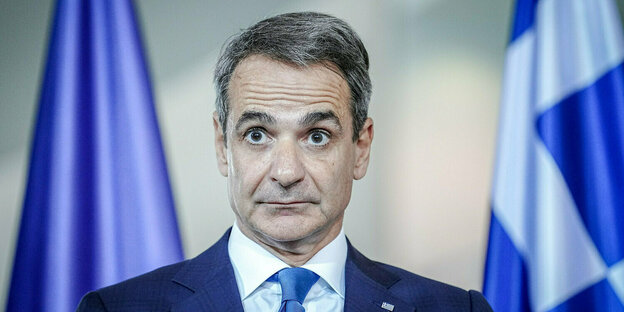The European Parliament warns Greece and its government against undemocratic tendencies. This could have financial consequences.

For Greek Prime Minister Kyriakos Mitsotakis, the European Parliament's warning is a resounding slap in the face Photo: Kay Nietfeld/dpa
ATHENS taz | For the first time since the end of the colonels' dictatorship in the summer of 1974, the European Parliament officially condemned EU member Greece in a resolution. The decision expressed MEPs' concerns about developments in Greece that threaten the rule of law, freedom of the press and fundamental individual rights. The European Commission was asked to take appropriate measures to return the EU member to the path of transparency, freedom of the press and the rule of law. Among other things, the European Commission was asked to “review” the disbursement of EU funds to Athens.
For the Athens government of conservative Prime Minister Kyriakos Mitsotakis, this is a resounding slap in the face and could have financial consequences.
The resolution was jointly presented by four political groups in the European Parliament: Left, Greens, Social Democrats and the liberal Renew. On Wednesday afternoon, 330 deputies voted in favor of approval, 254 against and 26 abstained. Human rights and press freedom organizations had previously sent a letter to the president of the European Commission, Ursula von der Leyen, in which they “demanded immediate action by the Commission” in the Greece case.
The conservative New Democracy (ND), led by Prime Minister Kyriakos Mitsotakis, has been in power in Athens since July 8, 2019. It was re-elected at the end of June last year and can continue to govern Athens alone until 2027.
Corruption is high in Greece, NGO confirms
The list of Greece's transgressions is long: growing corruption and lack of transparency, repeated attacks on press freedom, violation of basic individual rights following a gigantic phone hacking scandal, escalation of police violence, lack of democratic control and an erosion growing. of the rule of law in the Mitsotakis era.
Last week there was already bad news for Greece. In the global corruption ranking published by the non-governmental organization Transparency International (TI) for 2023, Greece ranks 59th out of 180 countries. Consequently, Hellas has a TI Corruption Perception Index (CPI) of 49 points. A CPI score of 100 means a country is completely free of corruption, while a score of zero means it is completely corrupt.
Greece has a “serious corruption problem,” TI notes. Among the 27 EU countries, Greece ranks 24th. Only Romania, Bulgaria and Hungary perform even worse. And compared to last year, Hellas fell eight places in the global IT ranking compared to last year.
The reason for this can be read in the TI report: “The consequences of the government's (Mitsotakis) allegedly illegal interception of journalists' and politicians' communications, attacks on press freedom and the limited independence of the judiciary have led to the steepest decline in the rule of law in the country that the EU contributed to.” TI's concern is also “the excessive government interference in the phone hacking scandal with reports of threats against members of the supervisory authority “independence and obstruction of witnesses”.
The current global rankings by “Reporters Without Borders” (RSF) also do not shed a good light on Greece when it comes to press freedom. With 55.2 points out of a maximum of 100 points, the country occupies a shameful 107th place, the last in the EU. In RSF's world press freedom ranking in 2019, before the Mitsotakis government took the reins in Athens, Greece still ranked 65th. This means that Hellas has fallen a total of 42 places in the national freedom ranking of press in four years. during the Mitsotakis era.
The murder of two journalists in Hellas went unpunished
The European Center for Press and Media Freedom (ECPMF), based in Leipzig, has examined the seriousness of the situation in terms of press freedom in the Peloponnese. A recently published special report states, among other things: “Greece is the only EU country where the murderers of journalists have not been punished in two cases” and: “Hardly any other EU country has recorded such a number of cases”. of physical attacks on journalists.” There are also a large number of lawsuits against media professionals (so-called SLAPPs), the special report complains.
The European Parliament sees the generous EU funds for Greece as the lever to return Greece to the path of transparency, freedom of the press and the rule of law. From 2021 to 2027, EU funding totaling €57.35 billion is expected to flow to Athens. This corresponds to around four percent of Greece's gross domestic product each year. This windfall is a blessing for Mitsotakis and his government. Compared to its economic performance, no country receives as much EU funding as Hellas.
The EU has already shown that it can use this lever: due to shortcomings in the rule of law, funds have already been withheld for Poland and Hungary in order to encourage the elimination of grievances in the local judicial and media landscape. In its resolution, the European Parliament now asks the European Commission to check whether this means of pressure can also be used in the case of Greece.
A look at Thursday's editions of the Greek press shows how serious the issue of press freedom is in Greece: most media outlets were silent on the European Parliament's condemnation of Greece.